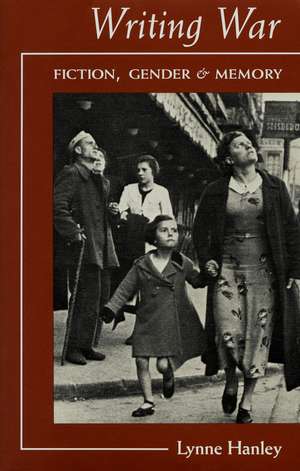Writing War: Fiction, Gender, and Memory
Autor Lynne T. Hanleyen Limba Engleză Paperback – 11 apr 1991
The narratives in Writing War displace the soldier as the mouthpiece of war, reminding the reader that the makers of war are not its only victims. These stories assume that women, children, noncombatants, and the enemy have an experience of war as much worth telling and remembering as is the story of any soldier. And the stories insist on the links between men and women at war, men and women in books, and men and women at work, play, home, and in bed. These stories demonstrate how the ideas explored speculatively in the essays on war literature permeate the air we breathe and inform the lives we lead.
Preț: 169.20 lei
Preț vechi: 196.80 lei
-14% Nou
Puncte Express: 254
Preț estimativ în valută:
32.39€ • 35.19$ • 27.22£
32.39€ • 35.19$ • 27.22£
Carte indisponibilă temporar
Doresc să fiu notificat când acest titlu va fi disponibil:
Se trimite...
Preluare comenzi: 021 569.72.76
Specificații
ISBN-13: 9780870237485
ISBN-10: 0870237489
Pagini: 168
Dimensiuni: 137 x 215 x 13 mm
Greutate: 0.21 kg
Ediția:First Edition
Editura: University of Massachusetts Press
Colecția University of Massachusetts Press
ISBN-10: 0870237489
Pagini: 168
Dimensiuni: 137 x 215 x 13 mm
Greutate: 0.21 kg
Ediția:First Edition
Editura: University of Massachusetts Press
Colecția University of Massachusetts Press
Notă biografică
Lynne Hanley publishes both short stories and literary criticism. She is professor emerita of literature and writing at Hampshire College.
Recenzii
"Unusual as it is powerful, this study consists of linked essays interspersed by short stories, all based on the general theme of women and war. Hanley (Hampshire College) begins by taking issue with Paul Fussell's important work, The Great War and Modern Memory (1975), calling it a narrow analysis of war literature, based exclusively on the writings of white English and American men. The author sees Fussell's study deliberately suppressing war texts written by women, especially pernicious in this period of canon formation. As remedy, Hanley critically examines the writings of women who make the matter of war a central part of their evolving thought: Virginia Woolf, Joan Didion, and Doris Lessing, in particular. . . . Hanley's short stories, her war literature, cover the impact and aftermath of war. The stories movingly express fear, dislocation, monstrousness. Both essays and stories are accessible, a clear explication of an important feminist critical stance. Highly recommended."—Choice
"Hanley believes that an established 'canon' of war fiction, which sentimentalizes the viewpoint of an individual white male soldier, serves as society's collective memory of war. Since women do not normally write from the battlefield, they have been excluded from the canon. But the front is not only on the battlefield--especially now, in the nuclear age. In her stories, Hanley tries to create an alternative memory of war, one that includes the views of victims, the 'enemy,' and those who stayed at home, such as women and children."—Booklist
"Hanley believes that an established 'canon' of war fiction, which sentimentalizes the viewpoint of an individual white male soldier, serves as society's collective memory of war. Since women do not normally write from the battlefield, they have been excluded from the canon. But the front is not only on the battlefield--especially now, in the nuclear age. In her stories, Hanley tries to create an alternative memory of war, one that includes the views of victims, the 'enemy,' and those who stayed at home, such as women and children."—Booklist
